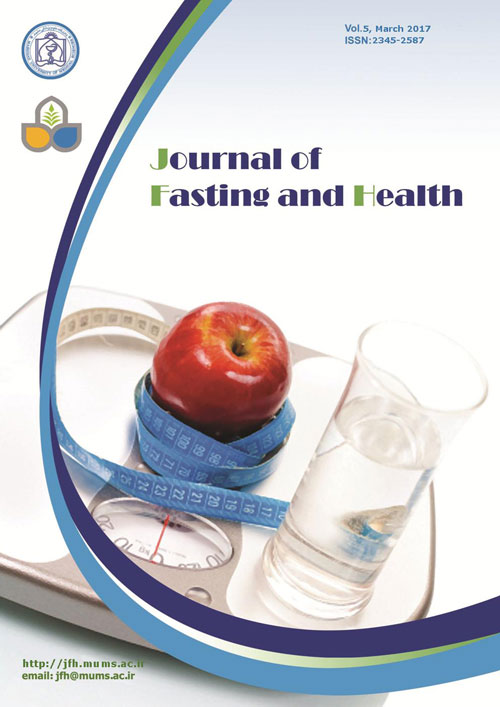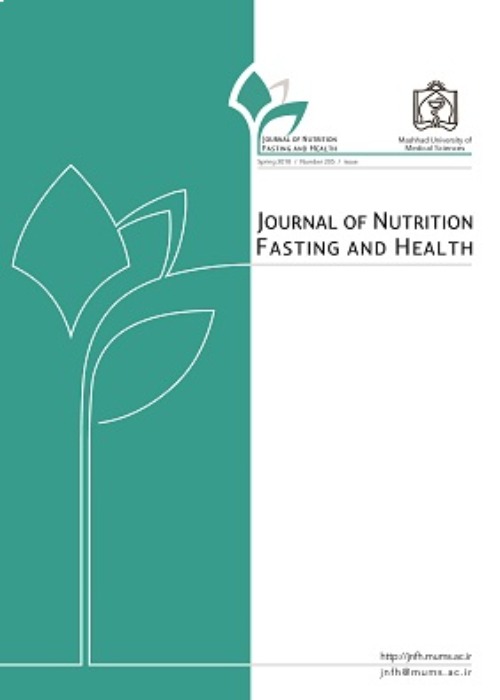فهرست مطالب

Journal of Nutrition, Fasting and Health
Volume:5 Issue: 1, Winter 2017
- تاریخ انتشار: 1395/11/30
- تعداد عناوین: 5
-
-
Pages 1-5Background and ObjectivesAnnually, many Muslims fast during the month of Ramadan worldwide. This practice has different favorable medical and physiological effects, such as improved serum lipid profile and blood glucose level due to changes in diet and sleep patterns. It has also been hypothesized that Ramadan fasting may affect the immune system. As reported, Ramadan fasting can influence the immunoglobulin and cytokine levels. Accordingly, tuberculin skin test or purified protein derivative (PPD) test, which is a delayed-type hypersensitivity of cellular immune response, may also be affected by Ramadan fasting. Regarding this, the present study aimed to investigate the alteration of PPD test during and after Ramadan.Materials and MethodsA total of 42 males (seminary students) who fasted during Ramadan in 2006 were included in the study; however, only 28 cases completed the study. For data collection, the participants underwent blood and tuberculin tests at the fourth week of Ramadan and three months after this month. The white blood cell (WBC) count and the tuberculin induration were recorded and compared between the two intervals to evaluate the changes.ResultsAccording to the results of the study, the mean age of the participants was 19.21±3.83 years. Furthermore, the mean tuberculin induration was 9.3±5.4 mm (size range: 2-22 mm) on the fourth week of Ramadan, which increased to 9.79±6.8 mm (size range: 3-35 mm) three months after this month (P=0.501). The mean count of WBC decreased insignificantly from 5907±1879 mcL to 5601±1362 mcL after Ramadan (P=0.334). Additionally, the mean lymphocytes count decreased significantly from 2292±520/mcL to 2023±486/mcL after this month (P=0.003). Likewise, the lymphocyte (P=0.014) and mean neutrophil percentage also reduced significantly (P0.05).ConclusionAs the findings of the present study indicated, Ramadan fasting induce some changes in the immune status, including lymphocyte and neutrophil percentage and count; however, it does not affect the PPD results.Keywords: fasting, Tuberculin Test, Leukocytes
-
Pages 6-11IntroductionDuring Ramadan, type and amount of energy intake dramatically change in Muslims and fasting individuals often reduce the duration and intensity of physical activities or avoid exercise during this month. However, one of the major issues of trainers and athletes is lack of training, which could have adverse effects on some cardiovascular parameters.MethodsThis research was conducted on 19 healthy menopausal women, selected via convenience and purposive sampling. Two study groups consisted of inactive menopausal women with fasting (n=9) and fasting women with a detraining period (n=10), who regularly exercised before Ramadan, but avoided physical activity during this month. Anthropometric indices, maximum oxygen uptake and lipid profile indicators of the samples were measured before and after Ramadan. Data analysis was performed using Student's t-test.ResultsIn this study, no significant changes were observed in the body composition indicators: body mass index, body fat percentage and waist-to-hip ratio of the study groups. According to our findings, while the maximum oxygen uptake decreased in both groups, this reduction was not statistically significant. In addition, while high-density lipoprotein levels significantly decreased and low-density lipoprotein levels significantly increased, no significant changes were observed in the levels of total cholesterol and triglyceride in the fasting with a detraining period group.ConclusionAccording to the results of this study, while fasting for one month led to no significant improvement in the cardiovascular risk factors of inactive postmenopausal women, it had no adverse effect on lipid profile indicators.Keywords: Detraining, Lipid profile, Postmenopause, Ramadan fasting
-
Pages 12-19IntroductionObesity is a complex health problem. The aim of this study was to determine the effects of regular walking with alternate day fasting (ADF) on health-related factors of overweight and obese females.ýMethods30 healthy inactive, overweight and obese women were divided randomly into three equal groups. The groups were: control group (BMI: 30.72±4.40 kg/m2); the experimental group I: ADF along with regular walking with 50% to 65% maximal heart rate (BMI: 28.69 ±2.81 kg/m2) and the experimental group II: ADF (BMI: 30.56 ±3.66 kg/m2). Participants were under the diet for six weeks. The diet ADF means that, they had days of fasting and free day (with regular walking), alternately. Two days before and two days after the end of the study, the participants fasting blood sugar were measured after 12 hours. Resting heart rate, blood pressure and body composition were assessed in the same day. The collected data were analyzed using paired t-test and ANOVA test.ResultsBody mass index in both experimental groups had significant decreaseý (P0.05).ConclusionThe regular walking program and ADF diet is an effective method for improving body mass index, body fat percentage and blood sugar.Keywords: BMI, Obesity, Diet, Walking
-
Pages 20-23IntroductionRamadan is the ninth month of Muslim's calendar during which Muslims fast. Ramadan lasts 29-30 days based on the visual sightings of the crescent moon. Fasting during Ramadan has significant health effects. The present study aimed at reviewing the literature of the impact of Ramadan fasting on upper gastrointestinal disorders.MethodsMEDLINE and Google Scholar were searched by using ((Ramadan R fasting) AND( "Upper Gastrointestinal Tract" OR "Gastrointestinal Diseases" OR "Dyspepsia" OR "Gastroesophageal Reflux" OR "Peptic Ulcer" OR "Gastrointestinal Hemorrhage")) as keywords in the title and abstract. Relevant, non- duplicate full articles written in English were reviewed.ResultsGastric acid and pepsin secretion increase during Ramadan fasting, probably associated with dyspeptic symptoms. Regarding peptic ulcer frequency, results are inconsistent. However, peptic ulcer complications such as gastrointestinal bleeding and peptic ulcer perforation increase during Ramadan fasting.ConclusionFasting during Ramadan seems to be beneficial for healthy individuals, but in people with gastrointestinal disorders, it might be harmful as it increases the risk of complications. Therefore, taking medical advice before Ramadan fasting is highly recommended to people suffering from gastrointestinal symptoms.Keywords: Ramadan fasting, upper gastrointestinal diseases, Dyspepsia, Gastroeosophagial reflux, Gastrointestinal hemorrhage, Peptic ulcer
-
Pages 24-30BackgroundChronic diseases almost always result in physical, psychological, financial, and social burdens on the patients and the economy. Studies examining the effects of fasting on diabetes during Ramadan emphasized the biochemical changes without considering the psychosocial and financial implications. This study aimed to illuminate some of the challenges faced by both fasting and non-fasting diabetic patients during Ramadan.MethodsThis was a community-based cross-sectional study conducted from August 2015 to October 2015. Diabetes 39 instrument was administered to 112 patients with diabetes in Khartoum to evaluate their health-related quality of life during Ramadan.ResultsFifty-four percent of study participants were female and 64.3% were between 40-60 years old. Sixty-two participants were able to fast (55.4%) and more than 80% of these fasted for > 15 days. Half of the participants had, at least, one comorbidity with hypertension being the most common. Approximately 59% of fasting patients had mild impairment in their health-related quality of life, whereas 60% of non-fasting participants had moderate impairment. Limited energy levels, the need to rest often, and fear of hypoglycemia were the items with the highest mean scores in both groups. The fasting group had a lower average score (2.88) when compared to the non-fasting group (3.66). This difference was statistically significant (p=0.033).ConclusionOver 53% of study patients fasted for at least for 1 day during Ramadan. Interestingly, Patients who fasted had a better health-related quality of life when compared to those who did not fast.Keywords: Diabetes, Ramadan, Quality of life, fasting


